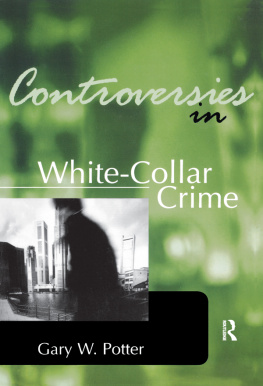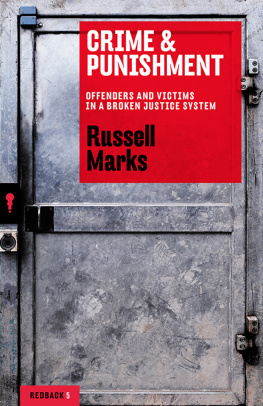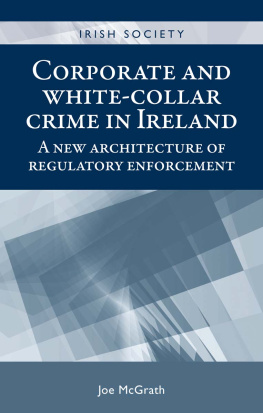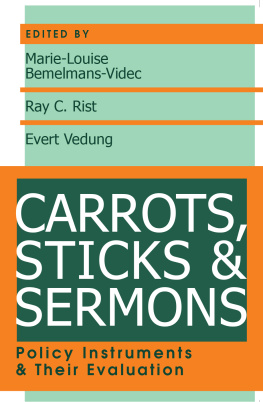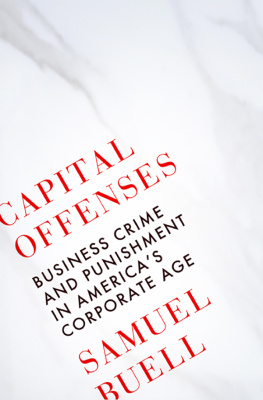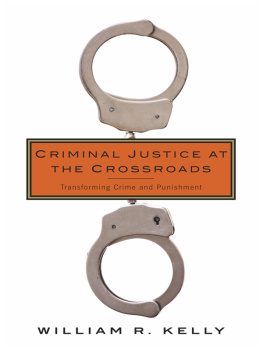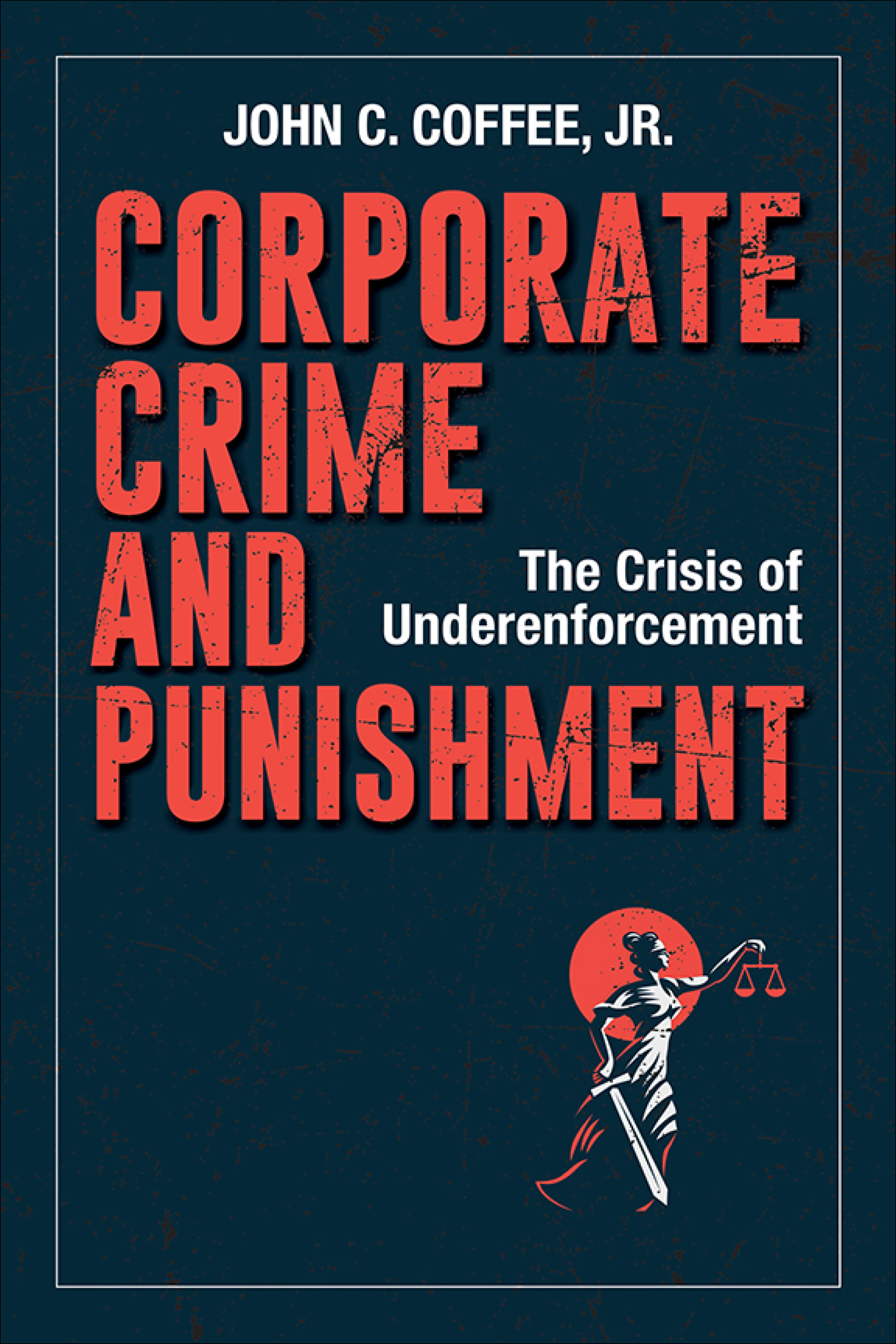Corporate Crime and Punishment

THE CRISIS OF UNDERENFORCEMENT
John C. Coffee Jr.
Adolf A. Berle Professor of Law and
Director of the Center on Corporate Governance
at Columbia University Law School

Corporate Crime and Punishment
Copyright 2020 by John C. Coffee Jr.
All rights reserved. No part of this publication may be reproduced, distributed, or transmitted in any form or by any means, including photocopying, recording, or other electronic or mechanical methods, without the prior written permission of the publisher, except in the case of brief quotations embodied in critical reviews and certain other noncommercial uses permitted by copyright law. For permission requests, write to the publisher, addressed Attention: Permissions Coordinator, at the address below.

| Berrett-Koehler Publishers, Inc.
1333 Broadway, Suite 1000
Oakland, CA 94612-1921
Tel: (510) 817-2277, Fax: (510) 817-2278
www.bkconnection.com |
Ordering information for print editions
Quantity sales. Special discounts are available on quantity purchases by corporations, associations, and others. For details, contact the Special Sales Department at the Berrett-Koehler address above.
Individual sales. Berrett-Koehler publications are available through most bookstores. They can also be ordered directly from Berrett-Koehler: Tel: (800) 929-2929; Fax: (802) 864-7626; www.bkconnection.com
Orders for college textbook/course adoption use. Please contact Berrett-Koehler: Tel: (800) 929-2929; Fax: (802) 864-7626.
Distributed to the U.S. trade and internationally by Penguin Random House Publisher Services.
Berrett-Koehler and the BK logo are registered trademarks of Berrett-Koehler Publishers, Inc.
First Edition
Hardcover print edition ISBN 978-1-5230-8885-0
PDF e-book ISBN 978-1-5230-8886-7
IDPF e-book ISBN 978-1-5230-8887-4
Digital audio ISBN 978-1-5230-8888-1
2020-1
Book producer: Westchester Publishing Services; Text designer: Laurel Muller; Cover designer: Peggy Archambault
This book is dedicated
to the love of my life (and wife of fifty years):
Dr. Jane Purcell Coffee, professor of mathematics
at the City University of New York.
Contents
Preface
This is not an academic book. If it were (and I have written several such books), it would have three times the footnotes and much more jargon. Instead the footnotes have been trimmed (reluctantly) and the jargon avoided (hopefully) to reach a broader audience. At least by design, this book is intended to be accessible to anyone interested in (1) white collar crime, (2) criminal justice administration in the real world, (3) why high-ranking executives seldom seem to be prosecuted, and (4) why certain aspects of contemporary corporate governance tend to be criminogenic. Thus, this books focus is on both corporate and criminal law, and this book is the product of the authors work in the field of white collar crime for over forty years and in the field of corporate law and governance for even longer.
This combination produces a special perspective. For example, others have explained the persistent phenomenon that high-ranking executives are seldom prosecuted using primarily political explanationsfor example, the enforcers were captured or the prosecutors were too risk averse. Without rejecting these explanations (which could sometimes be true), the more fundamental problem is that prosecutors function within understaffed, overworked bureaucracies that cannot normally undertake intensive investigations. Those who rise to managerial positions in such a bureaucracy are those who have learned how to stay within budget and achieve early settlements that allow their agency to claim a victory. This need to claim a victory (and quickly) is part of the unending struggle for credit in which agencies engage in order to justify a greater budget, and this need explains much about the behavior of enforcement agencies, including the recent popularity of deferred prosecution and nonprosecution agreements, the tendency for internal corporate investigations to be run by defense counsel (and not the prosecutor), and the desire of enforcement agencies to avoid protracted litigation. Bureaucracies, including U.S. Attorneys and the Securities and Exchange Commission (SEC), need to celebrate claimed victories, while staying within budget, if they are to convince legislatures to allocate them greater funds. This is a difficult balancing act and sometimes an impossible one when a major new crisis arises.
Although this diagnosis that prosecutors are too logistically constrained to undertake intensive investigations applies easily to such cases as Lehman Brothers and the other major firms that failed in 2008, the same pattern is also evident in more recent cases, such as the Boeing 737 MAX crisis, the behavior of major opioid manufacturers in selling on a wholesale basis to drug mills, the Volkswagen emissions scandal, and the failures of Pacific Gas and Electric Company (PG&E), where the organization knew at all levels that its equipment was aged and its forests were overgrown and vulnerable to major forest fires. In none of these cases were prosecutors in a position to take on lengthy investigations that necessarily would have occupied a large staff for many months. Instead, they were under pressure to reach a quick settlementand they did. In large part, this was because experienced defense counsel understood the prosecutions logistical limitations and exploited them. The result is what this book calls underenforcement.
If this is the problem, what is the answer? This book explores alternative arrangements and strategies that could be used to redress the logistical imbalance that cripples white collar law enforcement. In this regard, this book is ultimately as much about corporate law as criminal law. What forces within the modern public corporation are criminogenic? What causes corporate executives to take high risk? A principal answer of this book is that high levels of incentive compensation induce managers to accept high riskboth operationally and legally. That is not an answer that an academic versed only in criminal law would give. In turn, it follows that a logical way to reduce excessive risk taking at a convicted corporation may be to restrict incentive compensation, and this is most feasibly done by imposing restrictive conditions of probation on the convicted corporation. This is a corporate solution to a criminal law problem, and this is the type of solution that this book will repeatedly offer.
Similarly, much of this book will be about procedure, but not traditional criminal procedure. For example, it will ask: How can we economize on the costs of investigation and prosecution? How can we induce or compel the corporate defendant to conduct an adequate investigation on which the prosecution can rely? Again, these are not the standard problems that traditional criminal procedure addresses. Current internal investigations, this book argues, tend to discover who was responsible only down at the base of the corporate pyramid, rarely going much higher. Although many recent commentators have justly criticized deferred prosecution and nonprosecution agreements, the better policy goal should not be to prohibit such agreements but rather to use them as the carrot that induces much greater cooperation by the corporation against its own executives. This divide and conquer strategy requires several steps that have not yet been taken and on which this book focuses.


